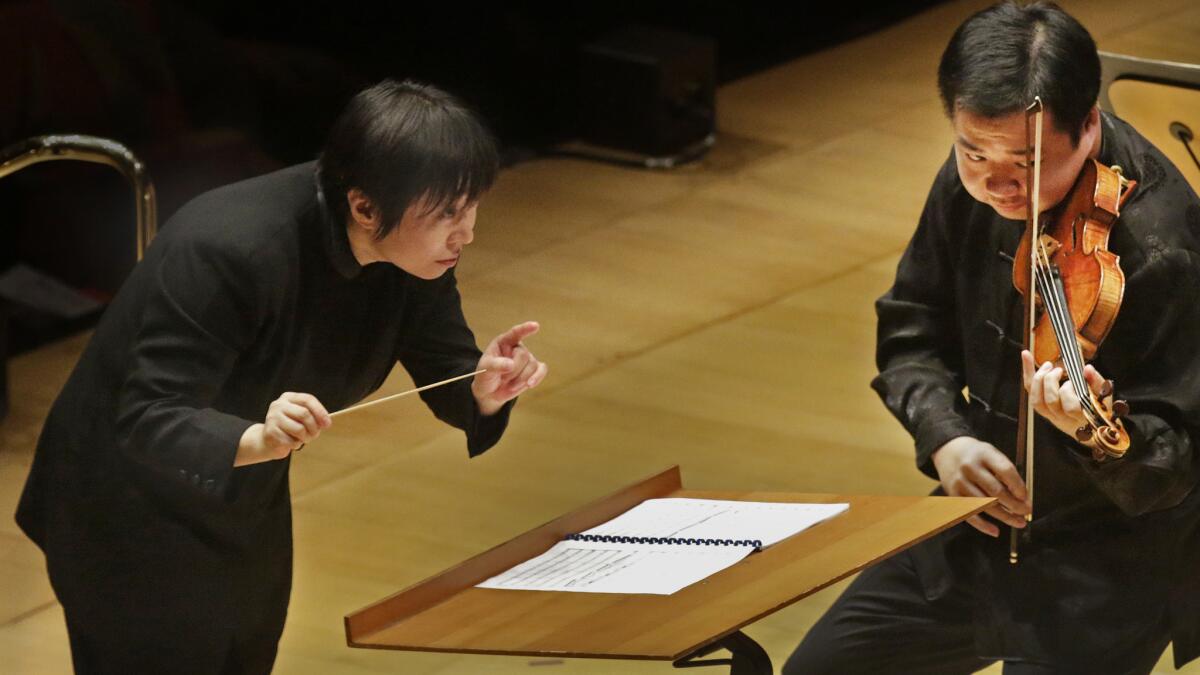Review: East meets West as the Phil celebrates Chinese New Year

- Share via
It has been many years since the Los Angeles Philharmonic — an orchestra less sentimental than most about programming around holidays or anniversaries — turned over New Year’s concerts to Pink Martini, and I’ve never heard a single complaint.
Revelers love Pink Martini. The orchestra loves not working the holiday. Critics don’t mind either.
But following the example of other orchestras in towns with large Chinese populations, the L.A. Phil decided to try its hand at a celebration for Chinese New Year. Thursday night, the interior of Walt Disney Concert Hall was lit red, not the usual blue. Chinese lanterns hung from the ceiling.
ESSENTIAL ARTS & CULTURE NEWSLETTER >> Get great stories delivered to your inbox
The conductor and soloists were Chinese. Colorful Chinese puppetry brought a parade of lovable lions and a dragon on stage. Ushers handed out cards wishing us, in English and Chinese, a prosperous year.
Let us wish the L.A. Phil a prosperous year as well. But let us also hope that prosperity is not dependent on what could be seen as a pandering subscription program more typical of the Boston Pops. The good news from what turned out to be an engaging evening is that you can have your nian gao, the Chinese New Year’s cake, and eat it too.
It has been six years since Xian Zhang, then a young former New York Philharmonic assistant conductor, made her debut conducting the L.A. Phil. She was electrifying, and her career has been taking off in Europe.
Her difficult task here was to make Li Huanzhi’s five-minute “Spring Festival” Overture and her soloists’ potboilers sound fresh. She did.
In Li’s overture from the Maoist 1950s, Chinese tunes are dressed up in Western orchestral clichés. Zhang’s boisterous energy gave it a lift.
Ning Feng, a young violinist with a sumptuous tone, was first up with Saint-Saëns’ once-ubiquitous, now less-common 19th century bonbon, Introduction and Rondo Capriccioso. He brought rapture. Zhang focused on tight orchestral detail. It was a perfect combination of old school and modernity.
Chopin’s Andante Spiniato and Grand Polonaise isn’t heard as much these days as it used to be either. It is not Chopin at his best, as even Orrin Howard had to admit in his program note. The orchestral part is without interest. Chopin performed it only once.
But the piano writing has elegance, and Haochen Zhang, the gold medal winner of the 2009 Van Cliburn competition, played it with panache. He is a chic young pianist who displays brilliance without undo flashiness and will be worth watching.
The most established of the soloists was cellist Jian Wang, whose Carnegie Hall debut was 29 years ago and who has recorded extensively. He got the most substantial solo piece, Tchaikovsky’s “Rococo” Variations. It is also a war horse. But the performance was original.
Jian probed deeply. He did not romanticize Tchaikovsky, yet he was not cool either. He has handsome tone, and his focus was on a richness of sound that drew you into not the cello but Tchaikovsky.
This was the first time on the program where Zhang had substantial orchestral music to work. She treated the orchestral sections as distinct blocks of color that served as a modern-seeming prismatic background to Jian’s wonderful lyricism. The combination could be likened to putting an elegant 19th century antique next to a Rothko painting, the canvas and antique unexpectedly enlivening each other.
The West Coast premiere of Tan Dun’s “The Triple Resurrection,” a 15-minute triple concerto, brought the three quite different soloists together. Tan has meant the triple concerto to be an addendum to “The Trilogy,” a symphonic triptych based on his scores to martial arts films. The main theme of “Crouching Tiger, Hidden Dragon,” for which Tan won an Academy Award, finds it way into the triple concerto (the L.A. Phil’s tribute to Oscar weekend?).
Then there is the opening of Wagner’s “Das Rheingold,” Tan having written the concerto in 2013 as a tribute to the Wagner bicentennial. Wagner’s Rhine, first in the piano and then rising from the orchestra, gets amusing Chinese turns of phrase, as though this were Das Yellow River.
Tan uses every populist trick in the book in his music, and a number of avant-garde ones as well. The brass blare Wagner and then rhythmically tap their mouthpieces as though they were accompanying Chinese opera. Wagnerian water is not enough for Tan. He has percussionists splash their hand in two bowls of water, the effect amplified.
The soloists swirled around through it all, each in his own virtuosic world. They blended exceedingly well. Zhang brought out gorgeous instrumental details in the orchestra.
Tan has a lot of dissenters these days. There are those in the new music community who think he sold out and those who think he hasn’t sold out enough and wish he’d give up on the avant-garde altogether. But at his best — as in this concerto, slight as it is — his music intersects pop and experimental as well as East and West as though the musical world really were one big happy family.
Maybe the L.A. Phil might consider getting back into the New Year’s Eve business after all.
Twitter: @markswed
------------
Los Angeles Philharmonic
Where: Walt Disney Concert Hall, downtown Los Angeles
When: 8 p.m. Saturday
Cost: $26.50-$197
Info: (323) 850-2000, www.laphil.org
More to Read
The biggest entertainment stories
Get our big stories about Hollywood, film, television, music, arts, culture and more right in your inbox as soon as they publish.
You may occasionally receive promotional content from the Los Angeles Times.











